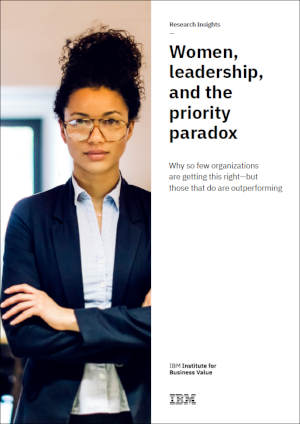Ungated Post | 01 Mar 2019
Women, leadership, and the priority paradox

While women may be in fewer leadership positions worldwide, those organizations with more females at the top outperform their peers.
Oxford Economics worked with IBM’s Institute for Business Value IBV to survey 2,300 executives and professionals – an equal number of women and men – from organizations worldwide across multiple industries to better understand why the gender gap in leadership persists and what can be done to ignite real change.
Respondents included individual C-suite officers (CEOs, CIOs, CFOs, CMOs, COOs, CHROs, and others) as well as senior VPs, VPs, directors, middle managers, and nonmanagerial professionals to capture current leaders’ assessments and assessments from those who could be potential future leaders.
The 10 industries represented included banking, consumer products, education, government, healthcare, insurance, manufacturing, retail, technology, and telecommunications. They each comprise 10% of the total sample. The countries/regions in the survey represent a mix of areas where the gender gap ranges from small to large, according to the World Economic Forum’s Global Gender Gap Report (2017). Each country (or region) comprises 11% of the total
sample.
Our Thought Leadership team produces original, evidence-based research made accessible to decision-makers and opinion leaders.
Oxford Economics’ team is expert at applying advanced economic tools that provide valuable insights into today’s most pressing business, financial, and policy issues.
Related Services

Post
The economic impact of abandoning the WTO
Oxford Economics have been commissioned by the International Chamber of Commerce (ICC) to provide an independent assessment of the economic impact of WTO dissolution. This report details our findings and the assumptions underpinning our analysis.
Find Out More
Post
The economic impact of the sports activities of public service media
This study shows how the sports activities of public service media supported €4.5 billion of GDP and 57,000 jobs across 31 European countries in 2022. The report also highlights wider economic benefits of public service media sports coverage, such as the way in which it leverages sponsorship income for sports bodies.
Find Out More
Post
Global Trade Education: The role of private philanthropy
Global trade can amplify economic development and poverty alleviation. Capable leaders are required to put in place enabling conditions for trade, but currently these skills are underprovided in developing countries. For philanthropists, investing in trade leadership talent through graduate-level scholarships is an opportunity to make meaningful contributions that can multiply and sustain global economic development.
Find Out More